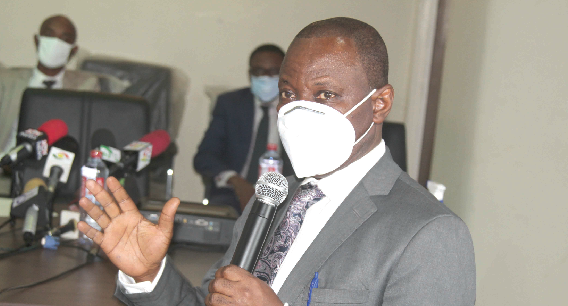The Ghana Health Service (GHS) is to resume a nationwide campaign to vaccinate children under five years against the polio virus as part of efforts at responding to the outbreak of the circulating vaccine-derived polio virus (VDPV).
The exercise, which is targeting about 4.6 million children, has become necessary following the detection of 31 (VDPV) cases nationwide from July to date.
A VDPV is a strain of the weakened polio virus that was initially included in oral polio vaccine but has mutated (changed over time) and behaves more like the wild or naturally occurring virus.
This means it can spread more easily to people who are unvaccinated against polio when they come into contact with the stool or respiratory secretions, such as sneeze droplets, of an infected person.
The polio virus may cause illness, including paralysis.
Event
Addressing the press in Accra yesterday, the Director-General of the GHS, Dr. Patrick Kuma-Aboagye, said the exercise would start from September 10 to October 11, this year.
The first round started in March this year, but was halted due to the ramifications of the coronavirus disease (COVID-19) pandemic.
He said although Africa had been certified to be free from wild polio, the presence of the virus in Afghanistan and Pakistan made wild polio a global threat.
That, coupled with the detection of 31 cases of the VDPV, meant it had become necessary to vaccinate the most vulnerable population in the country, who are children under five, Dr. Kuma-Aboagye said.
“This campaign will be conducted in eight regions. Round one will begin from September 10 to 13, 2020, with the round two from October 8 to 11, 2020,” he added.
Protection
He further explained that the eradication of all forms of polio required that almost the entire population must be vaccinated.
However, he said, some 2.4 million children born between January 2016 and February 2018, in particular, were naive to the polio type two virus due to some global operational challenges in a switch in vaccine during that period.
The director-general said following the national and global eradication of the type two wild polio virus of the three stereotypes in 2015, Ghana joined the global community to switch from the vaccine it was using at the time, known as the trivalent oral polio vaccine (tOPV), introduced in 1978 and which provided protection or immunity for all three polio viruses, to one that provided immunity for types one and three.
Those vaccines were referred to as the bivalent oral polio vaccine (bOPV) and the inactivated polio vaccine (IPV), respectively, because they proved to be more effective, he said.
“It has, therefore, become necessary that all children who have missed any of the polio vaccinations be vaccinated to help boost the national immunity against polio, prevent a retrogression of the gains made, as well as break further transmission of the non-wild polio in the country,” he said.
Dr. Kuma-Aboagye said the initiative was also to help avoid eroding the gains made over the years which led to organisations such as the World Health Organisation declaring Ghana polio-free in 2015.
He gave an assurance that the vaccine was very safe and posed no life threats to children and, therefore, appealed to parents to allow their children to be vaccinated to protect them from death or permanent disability.




Comments are closed.